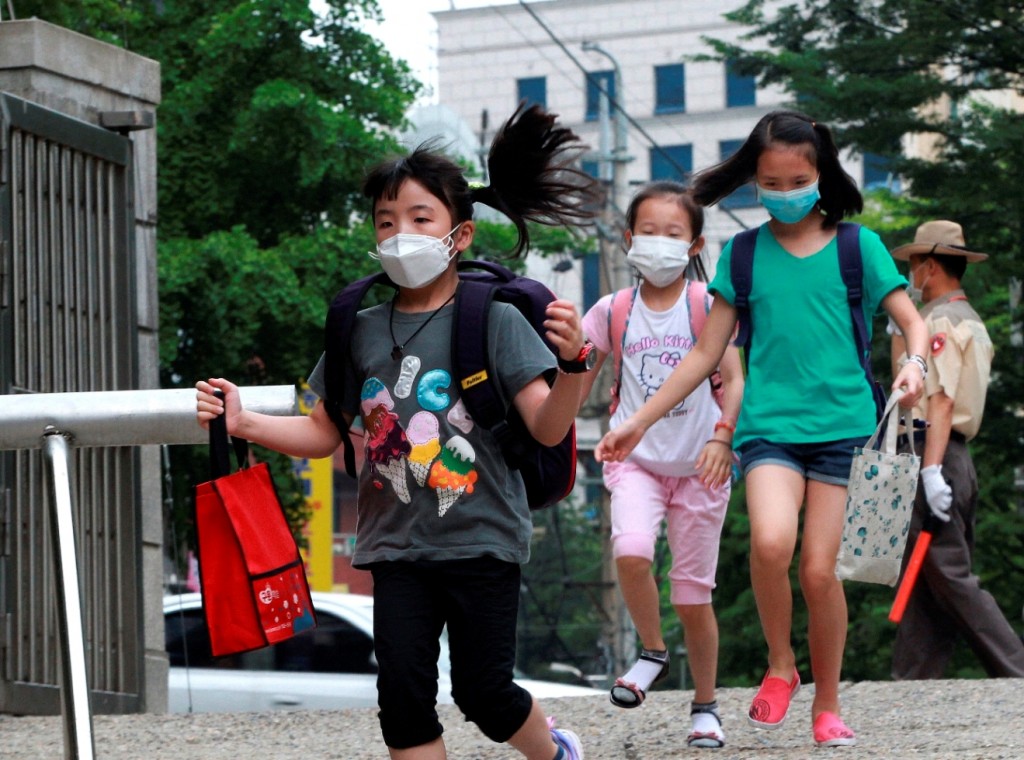- California Assembly OKs highest minimum wage in nation
- S. Korea unveils first graphic cigarette warnings
- US joins with South Korea, Japan in bid to deter North Korea
- LPGA golfer Chun In-gee finally back in action
- S. Korea won’t be top seed in final World Cup qualification round
- US men’s soccer misses 2nd straight Olympics
- US back on track in qualifying with 4-0 win over Guatemala
- High-intensity workout injuries spawn cottage industry
- CDC expands range of Zika mosquitoes into parts of Northeast
- Who knew? ‘The Walking Dead’ is helping families connect
6th person dies of MERS virus in South Korea, 23 more infected

Elementary school students wear masks as a precaution against Middle East Respiratory Syndrome virus as they arrive at Midong Elementary School in Seoul, South Korea Monday, June 8, 2015. South Korea on Monday reported its sixth death from MERS as authorities were bolstering measures to stem the spread of the virus that has left dozens of people infected. (AP Photo/Ahn Young-joon)
SEOUL, South Korea (AP) — South Korea on Monday reported its sixth death from Middle East Respiratory Syndrome as authorities were bolstering measures to stem the spread of the virus that has left dozens of people infected.
A total of 87 people in South Korea have been infected by MERS since last month in the largest outbreak outside the Middle East. About 1,870 schools have closed and more than 2,000 people are isolated at their homes or state-run facilities after having contact with patients infected with the virus.
An 80-year-old man, who tested positive for the virus last week while being treated for pneumonia, died Monday and became the country’s sixth death linked to MERS, according to a statement from the Health Ministry.
Departing from its earlier policy, the government on Sunday disclosed the names of the 24 hospitals where the MERS patients have been diagnosed or had been treated before their condition was confirmed. This will allow people who have visited those facilities in recent weeks to report themselves if they are showing symptoms similar to MERS-related illnesses, officials said.
The government had earlier refused to reveal the names of those hospitals saying it would cause a disruption in services if people started avoiding them. The disclosure came two days after the government first identified one hospital at the heart of the virus’s outbreak in South Korea.
Deputy Prime Minister Choi Kyung-hwan told a news conference Sunday that there was no reason to believe that the virus would significantly spread further in the country.
“So far, all the MERS cases have been hospital-associated, and there has been no case of an infection in other social settings. We think we have a chance at putting the outbreak under total control,” Choi said.
The virus has no vaccine, and health experts say it spreads through close contact with infected people and not through the air.
The U.N. health agency has reported that there’s no evidence yet in South Korea of “sustained transmission in the community.”
Choi said the government will also strengthen its monitoring of the hundreds of undiagnosed patients who are quarantined at their homes because officials believe they might have contracted the virus. It includes tracking their whereabouts through cellphone signals.
MERS was discovered in 2012 and has mostly been centered in Saudi Arabia. It belongs to the family of coronaviruses that includes the common cold and SARS, and can cause fever, breathing problems, pneumonia and kidney failure. The virus has spread primarily through contact with camels, but it can also spread from human fluids and droplets.
__
Associated Press writer Hyung-jin Kim contributed to this report.















